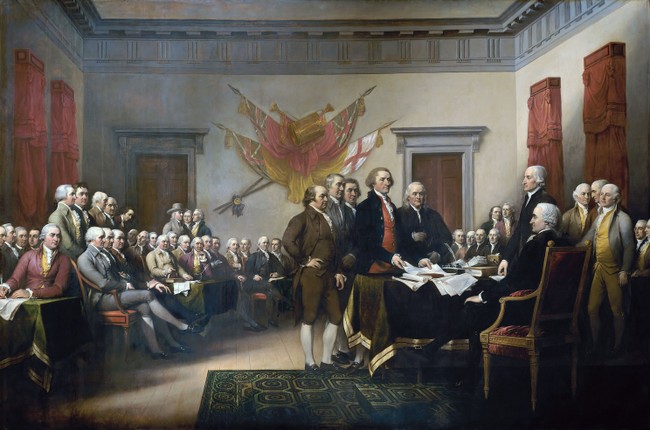


On that hot July 1776 day in Philadelphia, the Continental Congress voted for independence. And no, I don’t mean July 4.
The “Day of Deliverance” would be commemorated “by solemn Acts of Devotion to God Almighty,” by parades and illuminations, John Adams enthusiastically predicted. The great day was July 2, two days before the draft would be approved for release to the public, informing them that America’s colonies had declared independence.
The Continental Congress was divided among those who opposed independence altogether, those who were strongly in favor of it, and those who were persuadable one way or another. Massachusetts delegate John Adams was chafing. The American troops had been in the field fighting under George Washington for more than a year, Britain had made it clear that it would not hear the Americans’ pleas, and Adams couldn’t understand why Congress wouldn’t vote for independence.
Finally, in July, Adams had his chance. Richard Henry Lee of Virginia introduced the resolution instead of Adams, who seconded it, because Adams had attracted a lot of personal hostility for his aggressive campaign for independence (hence, he also did not lead the committee drafting the Declaration, avoiding votes against it on the grounds it was “his” Declaration). The resolution stated:
Resolved: That these United Colonies are, and of right ought to be, free and independent States, that they are absolved from all allegiance to the British Crown, and that all political connection between them and the State of Great Britain is, and ought to be, totally dissolved.
Adams wrote to his “dearest friend” and confidante, who also happened to be his wife, Abigail, “The Second Day of July 1776, will be the most memorable Epocha, in the History of America.—I am apt to believe that it will be celebrated, by succeeding Generations, as the great anniversary Festival.”
He enthused, “It ought to be commemorated, as the Day of Deliverance by solemn Acts of Devotion to God Almighty. It ought to be solemnized with Pomp and Parade, with Shews, Games, Sports, Guns, Bells, Bonfires and Illuminations from one End of this Continent to the other from this Time forward forever more.”
Related: Battle of Monmouth: Gen. Washington’s ‘Superb’ Leadership
So why do we celebrate July 4 instead of July 2, much to Adams’s chagrin? Well, the Declaration of Independence, as originally drafted by Thomas Jefferson and the other members of the committee of five (Adams, Ben Franklin, Roger Sherman, and Robert Livingston), is not the one we know well. Some sections were removed or edited, including, unfortunately, a condemnation of slavery. The final draft was adopted on July 4, which is why we celebrate that as Independence Day.
We now see Independence Day as pure joy and celebration. Not quite so for the Declaration’s signers. Benjamin Rush subsequently wrote, decades later, to fellow signer Adams, “Do you recollect the pensive and awful silence which pervaded the house when we were called up, one after another, to the table of the President of Congress, to subscribe what was believed by many at that time to be our own death warrants?”
They were challenging the most powerful empire on earth. Some of the signers would die in the ensuing conflict, and some would lose their property or their family members. If the Americans had been defeated, the losses would have been that much greater for all of them. Could they truly win the Revolution, or would they all hang as traitors?
Of course, we now know the answer. The men who voted for independence and signed the Declaration made history and founded a new nation, on the glorious proposition “that all men are created equal, that they are endowed by their Creator with certain unalienable Rights, that among these are Life, Liberty and the pursuit of Happiness.”
Help us tell the truth about American history. Join PJ Media VIP and use promo code FIGHT to get 60% off your membership.
